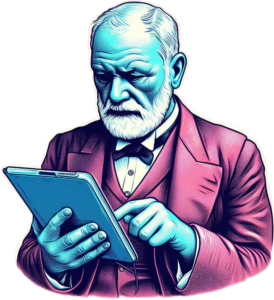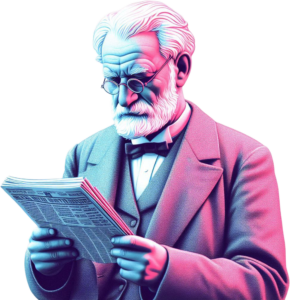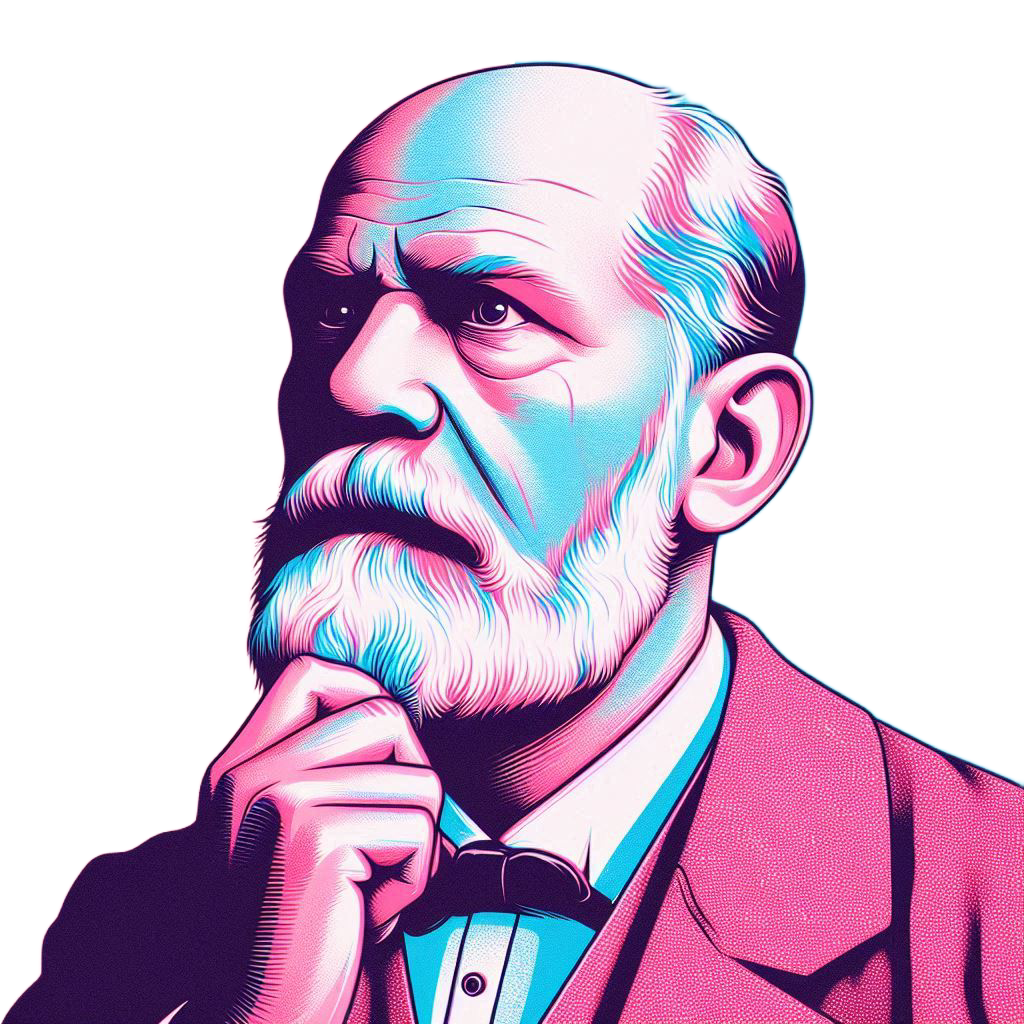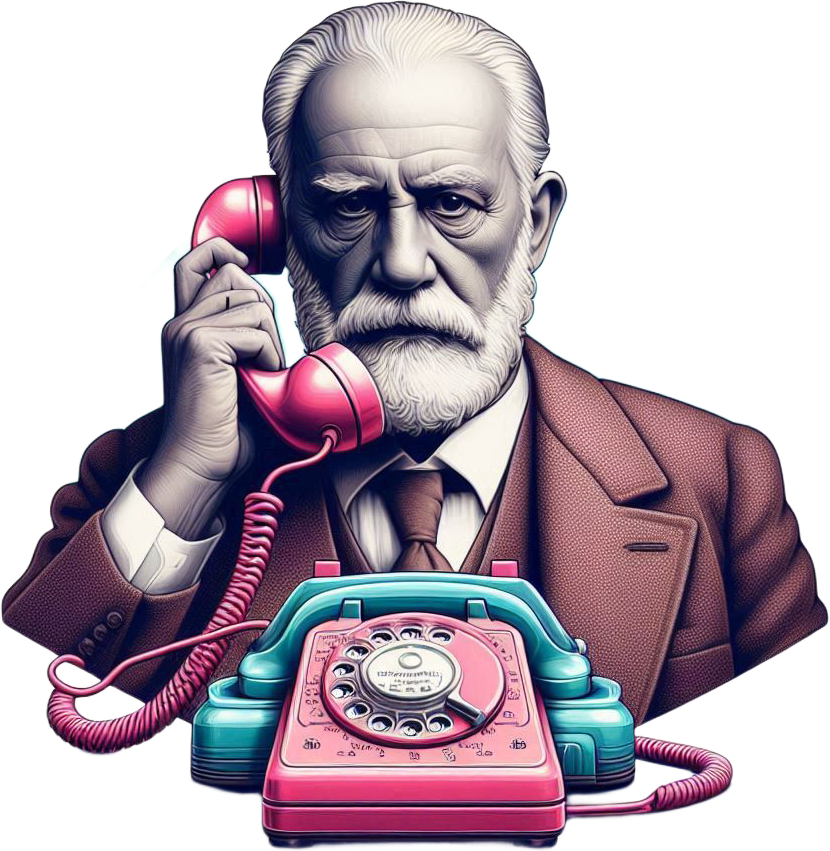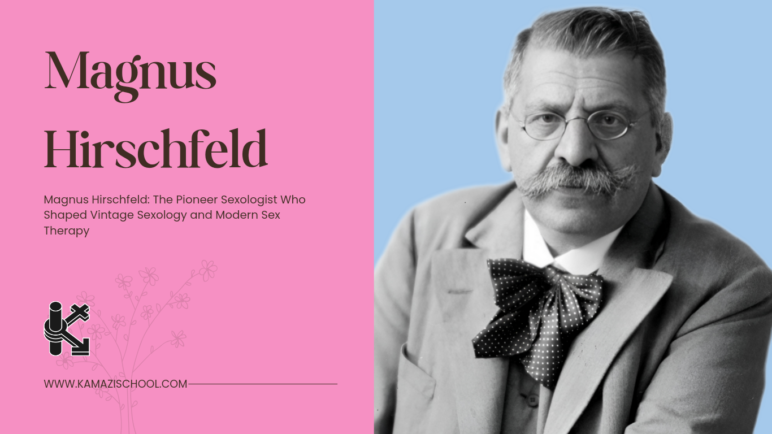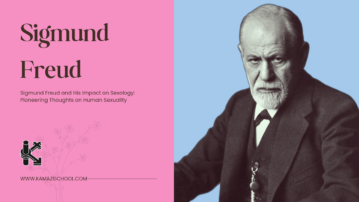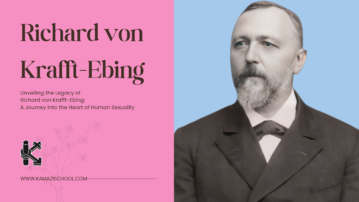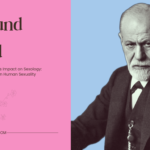
Sigmund Freud and His Impact on Sexology
June 28, 2024
An Adult Coloring Book: Vagina Vibes (Mandala)
October 24, 2024Table of Contents
Introduction
Magnus Hirschfeld: The Pioneer of Modern Sexology
How much do you know about the history of sexology? Have you ever wondered who laid the foundations for our modern understanding of human sexuality? One name stands out in this domain—Magnus Hirschfeld, a pioneering sexologist whose work reshaped our views on sexual orientation, gender identity, and sexual diversity. As the founder of the first Institute for Sexual Science, Magnus Hirschfeld’s contributions continue to influence both research and therapy, making him a key figure in sexology today.
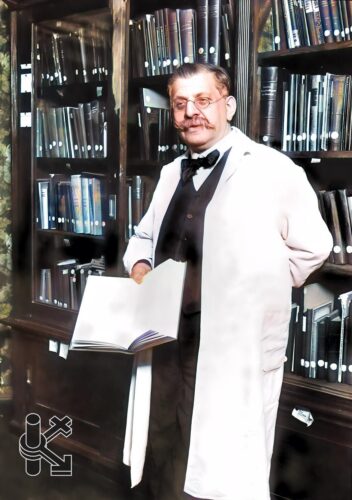
A Sanctuary of Knowledge: Magnus Hirschfeld in His Library
A Revolutionary Figure in Vintage Sexology
Magnus Hirschfeld, often recognized as the father of vintage sexology, was an innovative thinker at a time when sexuality was shrouded in taboo. His work, which began in the late 19th century and extended into the early 20th century, helped to break down stigmas surrounding sexual orientation, gender identity, and other aspects of human sexuality. Hirschfeld’s scientific and compassionate approach to sexuality was groundbreaking, especially during an era when such topics were rarely studied or discussed openly.
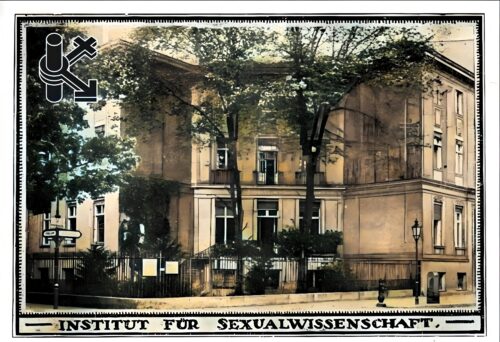
Institute for Sexual Science in Berlin
In 1919, Magnus Hirschfeld founded the Institute for Sexual Science in Berlin, the world’s first institute dedicated to the scientific study of human sexuality (To read more about the institution you can check their website). The Institute wasn’t just a research facility—it also served as a refuge for people marginalized by their sexual orientation or gender identity. Despite the tragic destruction of the Institute during the Nazi regime, Hirschfeld’s influence on sexology continues to resonate today.
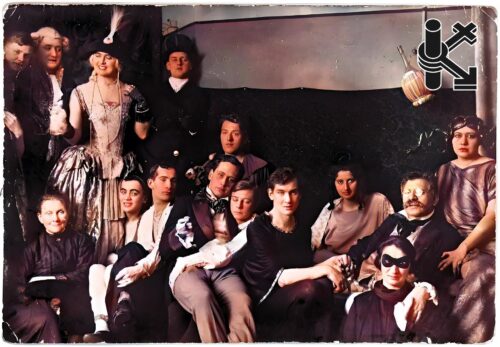
A festive gathering at the Institute for Sexual Research in Berlin, with the date and photographer remaining a mystery. Magnus Hirschfeld, wearing glasses, shares a moment with his partner, Karl Giese, at the center of the celebration. Photo courtesy of the Magnus-Hirschfeld-Gesellschaft e.V., Berlin.
1933: The Fall of Magnus Hirschfeld’s Visionary Institute
In the early days of Nazi Germany, the Institute for Sexual Research, founded by Magnus Hirschfeld, became a target of intense scrutiny and hostility. The institute was a pioneering space for the study of sexuality, advocating for sexual rights and gender diversity. However, its progressive ideas clashed violently with the Nazis’ repressive ideology.
In 1933, under the pretext of “purifying” German culture, Nazi forces stormed the institute. They destroyed invaluable research, manuscripts, and a vast library that included works on sexuality, psychology, and social science. This act wasn’t just about books; it symbolized a broader attempt to erase any dissenting voices and alternative viewpoints that contradicted the Nazi worldview.

Two Nazi officers meticulously gather banned books, enforcing a regime of censorship and control over knowledge. This act of suppression aimed to erase diverse voices and ideas, shaping a dark chapter in the history of intellectual freedom.
The burning of these texts had far-reaching effects. It silenced crucial conversations about sexual health and identity, reinforcing harmful stereotypes and stigma. The destruction of knowledge not only affected scholars and activists of the time but also set back the understanding of human sexuality for generations. The flames of that day represented a chilling reminder of how power can be wielded to suppress truth, leaving a void that would take decades to fill. The legacy of this destruction still resonates, emphasizing the importance of protecting diverse perspectives in any society.
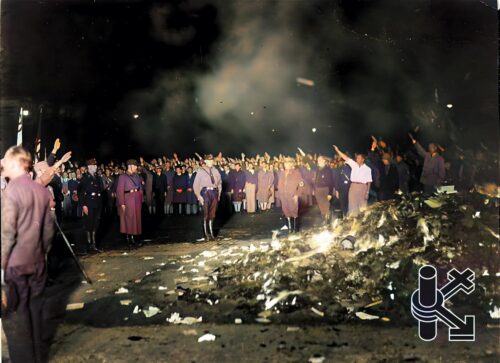
A towering heap of the Institute’s books, reduced to ashes in a brutal act of censorship. This fiery destruction symbolizes the loss of knowledge and the erasure of voices that dared to challenge oppressive ideologies.
Hirschfeld’s Approach to Sexual Diversity
Hirschfeld was one of the first to advocate for the decriminalization of homosexuality and the recognition of sexual diversity. He believed that sexual orientation and gender identity were natural variations in human biology, and he worked tirelessly to challenge societal prejudices. His research and activism helped shape a more inclusive view of sexuality, one that acknowledged the vast spectrum of sexual behaviors and sexual identities.
Magnus Hirschfeld’s Influence on Vintage Sexology and Modern Sex Therapy
Magnus Hirschfeld’s contributions to vintage sexology have had a lasting impact on modern sex therapy. Hirschfeld emphasized the psychological and physiological aspects of sexuality, an approach that influenced Sigmund Freud, with both figures having a reciprocal influence on each other’s ideas about sexual development and the unconscious mind.
Hirschfeld was also deeply inspired by earlier pioneers like Richard von Krafft-Ebing and Havelock Ellis, whose works on sexual deviance and sexual education laid the groundwork for Hirschfeld’s focus on sexual diversity and rights. Together, these figures helped shape the early foundations of sexology.
Furthermore, Hirschfeld’s inclusive philosophy resonated with later pioneers such as Alfred Kinsey, William Masters, and Virginia Johnson, who built on his ideas to revolutionize sexual research. Ultimately, Hirschfeld’s work in vintage sexology continues to shape contemporary sex therapy, fostering a more compassionate inclusive approach.
REDISCOVERING THE ARCHITECTS OF SEXOLOGY
Commemorating The Visionaries Who Molded Our Perception Of Human Desire
Educational Impact
Hirschfeld was an ardent advocate for sexual education, arguing that knowledge was the key to freedom and acceptance. His teachings encouraged people to explore their own sexuality without fear or shame, a concept that is crucial in today’s therapeutic settings. Sex therapists now use these principles to help individuals and couples navigate sexual issues, fostering better communication and self-awareness.
The Literary Legacy of Magnus Hirschfeld
Hirschfeld was not only a researcher and activist but also a prolific author. His books continue to offer valuable insights into human sexuality, making him an essential figure in both academic and public discourse on the subject. Below are some of his most notable works:
1. “Sex in Human Relationships”
This book delves into the intricate connections between human relationships and sexuality. Hirschfeld explores how emotional intimacy and sexual attraction are intertwined, shedding light on the complex dynamics of love, sex, and societal expectations. His insights are still relevant to today’s understanding of sexual health and intimacy.
2. “Women East and West”
In this comparative study, Hirschfeld examined the roles of women in Eastern and Western societies, focusing on how cultural norms shaped gender roles and expectations. This work provides a cross-cultural perspective on female sexuality, highlighting both the differences and similarities in how women’s sexuality is understood across the globe.
3. “Sexual Pathology”
A landmark book in the field of sexology, “Sexual Pathology” offers a scientific examination of sexual behaviors that were once considered deviant. Hirschfeld’s non-judgmental approach revealed that many behaviors seen as abnormal were, in fact, natural variations of human sexuality. This book was instrumental in changing how society views sexual diversity.
4. “The Sexual History of the World War”
This work explores how the social upheaval caused by World War I influenced sexual behavior and attitudes. Hirschfeld’s analysis provides a unique historical perspective on how broader political and social events can shape human sexuality.
The Enduring Impact of Magnus Hirschfeld
Hirschfeld’s legacy as a pioneer sexologist continues to influence sexologists, therapists, and educators around the world. His contributions to sex therapy, LGBTQ+ rights, and sexual education have helped shape a more inclusive and understanding society. By advocating for the recognition and acceptance of sexual diversity, Hirschfeld laid the foundation for a world where individuals can express their sexual identity without fear of stigma or shame.
Advocating for LGBTQ+ Rights
Hirschfeld’s work in decriminalizing homosexuality and promoting LGBTQ+ rights remains one of his most significant achievements. His tireless efforts helped pave the way for many of the advances in LGBTQ+ rights that we see today, from legal protections to increased social acceptance.
Hirschfeld’s Influence on Future Generations
Hirschfeld’s influence extends beyond his lifetime, with modern sexologists and activists continuing to draw inspiration from his work. His groundbreaking research and advocacy for sexual freedom continue to guide contemporary discussions on sexual health, education, and therapy.
Conclusion
Magnus Hirschfeld’s contributions to the field of sexology are vast and far-reaching. His work in advocating for sexual diversity, promoting LGBTQ+ rights, and advancing sex therapy practices has left an indelible mark on our understanding of human sexuality. His compassionate approach continues to inspire today’s therapists and sexologists, helping us move toward a more inclusive and accepting world.
To delve deeper into Hirschfeld’s legacy, explore the wealth of resources available on our website, where you can read more about his pioneering work and its lasting influence on modern sex therapy.






